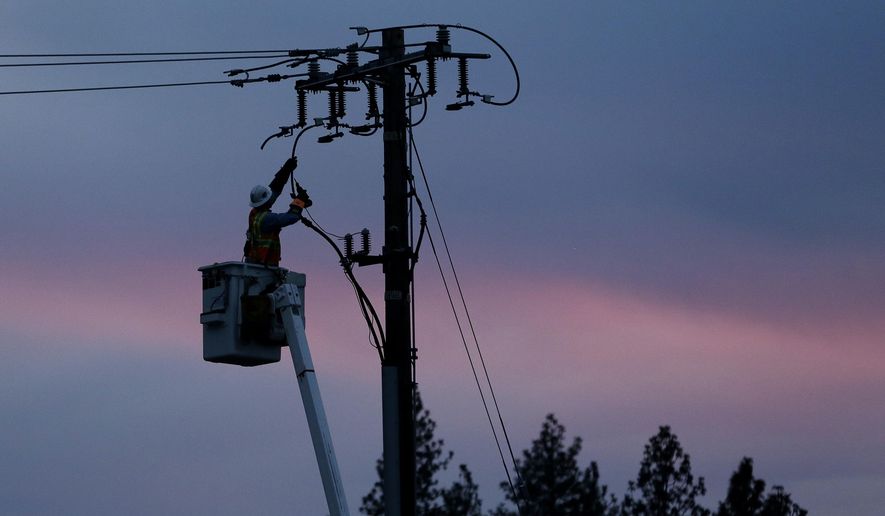BERKELEY, Calif. (AP) - California regulators on Thursday suspended a $200 million fine against Pacific Gas & Electric as punishment for the utility’s neglect of electrical equipment that ignited a series of deadly wildfires in Northern California.
The waiver approved in a unanimous vote by California’s Public Utilities Commission will deprive the state coffers of money to help offset losses income and sales taxes as the coronavirus pandemic pushes the state into a $54 billion budget deficit.
PG&E resisted the fine on the grounds that it would threaten its ability to raise the tens of billions of dollars needed to finance its complex plan to emerge from bankruptcy by a June 30 deadline.
Regulators backed down, despite a warning from the the commission’s public advocates office that letting PG&E get away without paying the $200 million would set a troubling precedent that could lead to more problems in the future.
“Rather than motivating PG&E to improve its abysmal safety record, a permanently suspended fine would encourage PG&E to devise future stratagems to avoid penalties,” the public advocate said.
The move reverses a February decision by an administrative law judge who determined the $200 million fine was justified in light of the devastation caused by PG&E’s misconduct. The commission blamed PG&E’s fraying electrical grid for causing 15 wildfires that killed more than 100 people and destroyed more than 25,000 homes and other buildings in 2017 and 2018.
The staggering losses of life and property drove PG&E into bankruptcy early last year. The San Francisco company is now scrambling to get out of bankruptcy before July so it can qualify for coverage from a wildfire insurance fund that California created last year.
Although PG&E will no longer have to pay any money into California’s general fund, it’s still being punished by regulators in the form of nearly $1.9 billion that it won’t be able to collect through higher electricity rates and other fees passed on to the roughly 16 million people who rely on the nation’s largest utility for power.
Regulators also are restricting some of the $425 million in tax savings the utility may realize from the $1.9 billion penalty, requiring it to be passed along to customers instead of funneled to its shareholders.
Clifford Rechtschaffen, the commissioner who recommended suspending the $200 million fine, acknowledged that waiving the penalty was “deeply dissatisfying.” But he said it was justified because of the extraordinary circumstances caused by the COVID-19 outbreak rattling the stock market.
The turbulence could make it more difficult for PG&E to raise money it needs to pay $25.5 billion in bankruptcy settlements, including a $13.5 billion fund set up for wildfire victims. Rechtschaffen concluded the $200 million fine would either risk siphoning money away from the victims or prevent PG&E from getting out of bankruptcy.
Before voting to suspend the fine, Rechtschaffen lashed out at PG&E for contending the penalty was unjustified at the same time it was negotiating an agreement to plead guilty to 84 felony counts of involuntary manslaughter for a 2018 wildfire that nearly destroyed the town of Paradise. PG&E is paying a $4 million fine in Butte County for those crimes.
Citing PG&E’s admission of guilt for the Butte County fire, Rechtschaffen called PG&E’s appeal of the $200 million fine “deeply disappointing” and “disingenuous.”
PG&E had no comment on Rechtschaffen’s rebuke but said it remains “deeply sorry” for causing the wildfires. “We share the same objectives as the commission and other state leaders - namely in reducing the risk of wildfire in our communities, even in a rapidly changing environment,” the company said in a statement.
Despite avoiding the $200 million payment to the state of California, PG&E has continued to run up legal bills and other bankruptcy costs that are expected to exceed $1.6 billion.
To get out of bankruptcy, PG&E needs the approval of a federal judge and state regulators. Before voting to suspend the fine, the commission heard more than a hour of public comments mostly objecting to perceived shortcomings in PG&E’s bankruptcy plan.
They contend PG&E isn’t doing enough to protect its customers from life-threatening hazards and deliberate blackouts for the next several years to reduce wildfire risks during hot and windy conditions.
The Public Utilities Commission is scheduled to vote on PG&E’s bankruptcy plan May 21.




Please read our comment policy before commenting.